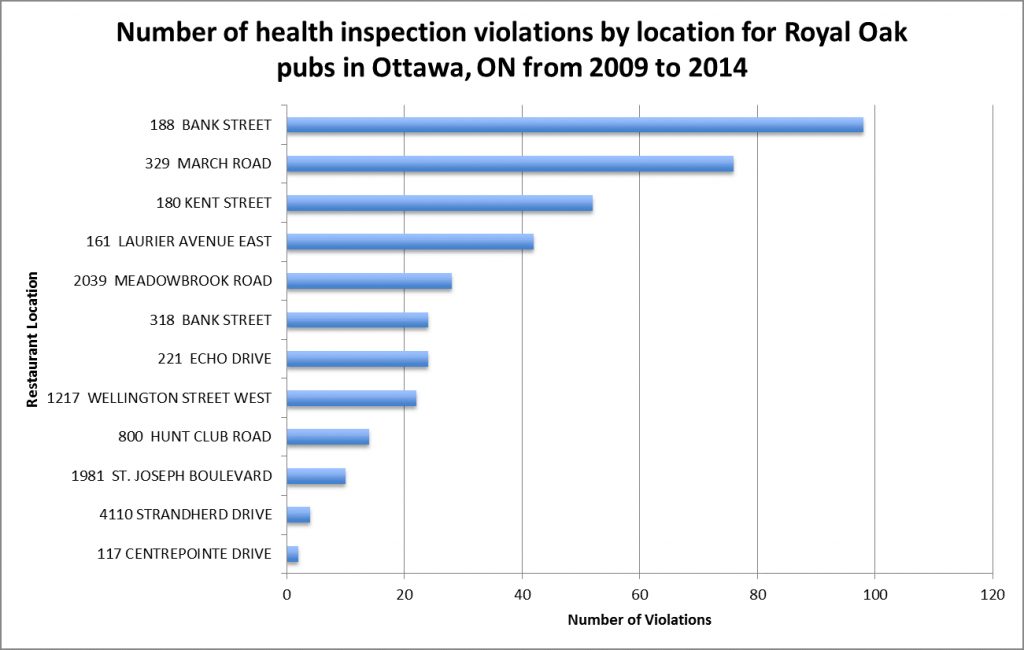By Amy Thatcher
The Royal Oak pub at 188 Bank St. may be the chain’s most unsafe Ottawa location.
Restaurant inspection data from the City of Ottawa reveals that the Bank street location has had 98 health violations in the past five years, from 2009 to 2014. And the trend is increasing—in 2009 the restaurant had just two violations, compared with 54 offences in 2014.
Second place for most offences went to the Oak’s 329 March Rd. location in Kanata, with 76 violations from 2009 to 2014. Third place was the 180 Kent St. location with 52 offences. The location at 117 Centrepointe Dr. had the fewest number of logged offenses—just two in five years.

“When you’re in somewhere every day, you don’t see the obvious,” says Jonathan Hatchell, CEO of the Royal Oak restaurants. “Having an independent eye is very good for a business.”
The Royal Oak has 12 restaurants across Ottawa, spanning from deep west in Kanata, to Barrhaven and eastern Orleans. Hatchell says his Royal Oak restaurants get inspected once or twice per month by Ottawa Public Health.
“Safety in the food service sector and avoiding health hazards is critical,” says Martha Healey, a food and life sciences lawyer in Ottawa.
She says the frequency of inspections is based on a risk assessment done by the city, so restaurants with higher traffic get inspected more often.
Hatchell says the higher number of violations at both the Bank and March Rd. locations is likely due to the age of the buildings that house those restaurants. He says the majority of violations in his restaurants come are filed as non-critical structural issues relating to the building rather than issues relating directly to food safety.
The City’s inspection data supported Hatchell’s claim, showing the most common violation for Royal Oak restaurants relates to having the floor, ceiling and walls in good repair. This offence accounted for a quarter of all violations.
“That one is very subjective,” says Hatchell. “It could be a ceiling tile that needs to be changed or it could be a cracked floor tile.”
The restaurants are inspected not only in their kitchens and food storing areas, but also in their dining areas and bathrooms. So some of the accounted violations may not be directly related to food safety.
Healey explains that during an inspection, violations can fall into two categories: critical and non-critical. Critical violations relate mainly to food handling practices that could lead to food borne illness. These violations can include things like inadequate refrigeration, inappropriate food temperatures, food storage issues and hand washing among others.
Those issues classified as non-critical don’t relate directly to food handling and may not affect food safety at all.
“It’s a fairly brutal environment that we work in, walls get banged, doors get slammed, these are the day to day challenges,” says Hatchell. “To be truthful, we’ll get people that will stick a knife in a cushion, or they’ll kick a bathroom wall…there’s heavy wear and tear on restaurants.”
The busiest locations—188 Bank St., March Rd. and Kent St.—line up with being the restaurants in the oldest buildings. Hatchell says this correlates to the high number of violations at these locations.
The Royal Oak pub group has recently invested half a million dollars into both 188 Bank St. and 329 March Rd. restaurants. Now, post-renovation, Hatchell expects the number of violations to decrease in 2015.
According to Healey, there are a range of orders that can be made under the Health Protection and Promotion Act in Ontario when health hazards are identified. If restaurateurs fail to comply, there are offences which could lead to fines as much as $25,000 for a corporation for each day the offence continued.
Hatchell says none of his restaurants have ever been fined or taken to court relating to health inspection offenses.
“We’ve been in business for 35 years in this city,” he says. “If you weren’t a responsible business operator with regards to food safety, you wouldn’t be in business that long.”


